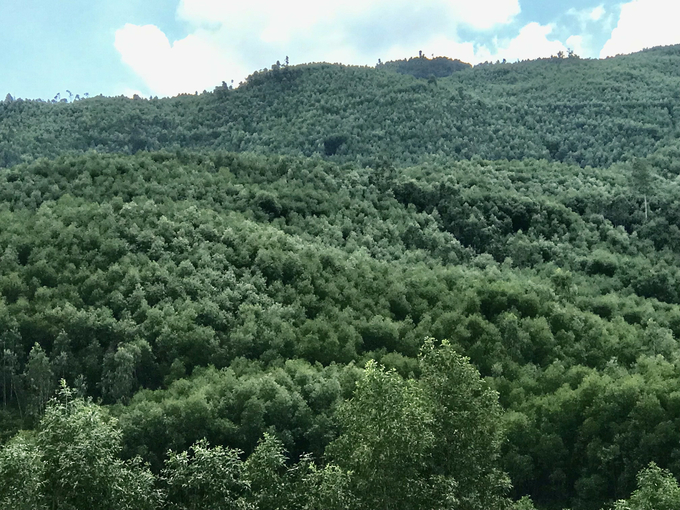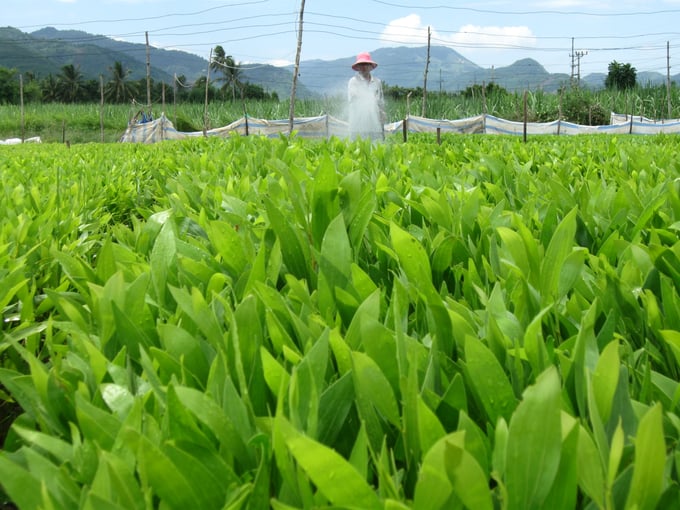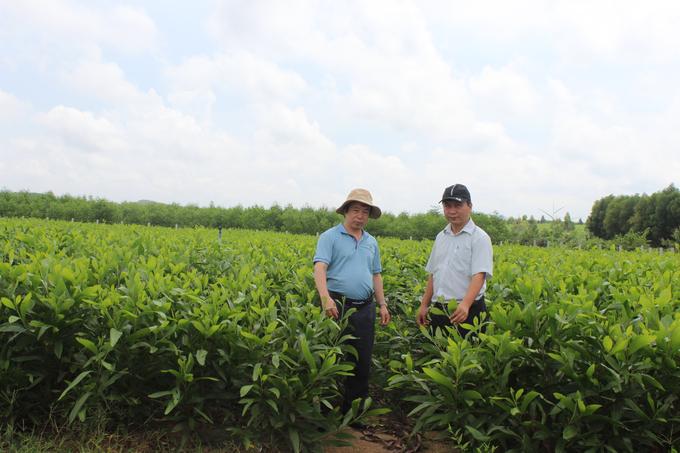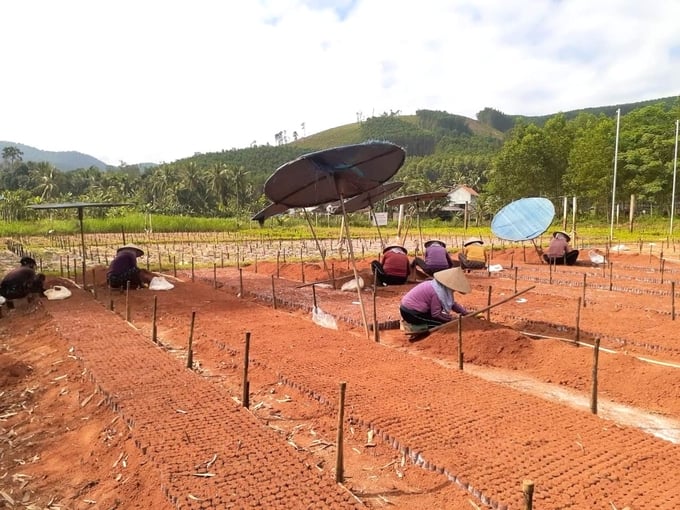May 21, 2025 | 00:16 GMT +7
May 21, 2025 | 00:16 GMT +7
Hotline: 0913.378.918
May 21, 2025 | 00:16 GMT +7
Hotline: 0913.378.918
Binh Dinh is regarded as a province with strong forestry development in the central region; this success is often attributed to the fact that the majority of forest growers use quality seedlings.

Thousands of forests planted in Phuoc My (Quy Nhon city, Binh Dinh). Photo: V.D.T.
Binh Dinh currently has nearly 146 units operating in the production and trading of forest tree seeds. In terms business registration types, there are 24 enterprises, 4 non-business units, and 118 production establishments. There are 3 units with tissue culture houses producing hybrid acacia and eucalyptus varieties, with the main focus being the U6 line. Regarding seed sources, Binh Dinh has 153 leading farms with an area of 44.14 hectares, providing hybrid acacia cuttings. The quality of forestry seedlings produced in Binh Dinh is trusted by not only forest growers in the province, but those from the Central-Central Highlands region, as well as from Laos and Cambodia.
The number of forestry seedling production facilities in Binh Dinh increases every year. For example, in the last 3 years: Binh Dinh produced 124 million trees in 2019 including more than 116 million trees of acacia hybrids from cuttings, nearly 8 million trees of acacia hybrid from tissue transplants; the number of forest varieties produced by Binh Dinh has increased to nearly 159 million trees by 2020 including nearly 152 million trees of acacia hybrids from cuttings, more than 7 million trees of acacia hybrids. The production of forestry seedlings in Binh Dinh increased to nearly 163.6 million trees in 2021 including nearly 151.4 million trees of acacia hybrids from cuttings , more than 12.2 million trees of acacia hybrids from tissue transplants.
Binh Dinh is considered as a province with excellent State management in the production and trading of forestry seed; with special focus on the implementation of granting and discarding seed sources upon expiration. As a result, forestry seedlings produced in Binh Dinh are trusted and highly commended by forest growers everywhere. However, poor quality forest tree varieties still exist on the market, which although few, can leave a bad impression on an otherwise model image.

Binh Dinh currently has nearly 146 units operating in the production and trading of forest tree seeds. Photo: V.D.T.
According to Mr. Nguyen Ngoc Dao, Chairman of Song Kon Forestry Company Limited, Vinh Thanh district, Binh Dinh, the aforementioned problems stem from the rushed type of forestry seed production facilities. For Acacia hybrid cuttings, cuttings from top-of-the-line farms do not meet the technical requirements; parent farms are not certified, not handled carefully, and cleaned well; infected farms; cuttings' quality is not guaranteed, secondary branches cuttings, etc.; all of which can lead to the production of poor quality seedlings.
According to Mr. Dao, forest growers buy poor quality seeds due to cheaper prices, or buy a type 2, type 3, or a rejected seedling through an intermediary party. Forest trees are long-term trees, so forest growers can only identify poor quality seedlings after 3 to 4 years of planting, and until that point, there are no papers to trace the origin; nor can forest growers remember where they bought the seedlings from to report to the respective authorities.
“When planting acacia hybrid, forest growers should order seedlings from 2 or more lines to prevent the risk of pests and diseases. The currently planted lines are AH1, BV75; BV33, BV32, AH7 and so on. Forest seedlings should be purchased from a registered business unit with a recognized seed source. When buying seedlings, forest growers must ask the seed seller to issue an invoice or an ex-warehousing note for traceability. If growers purchase seedlings through an intermediary, it is necessary to have an ex-warehousing note from the seed seller, specifying the type of tree, and the forest growers should contact the seed production unit to confirm such information", explained Mr. Nguyen Ngoc Dao.

Mr. Nguyen Ngoc Dao, Chairman of Song Kon Forestry Company Limited, Vinh Thanh District, Binh Dinh, at the company's seedling farm. Photo: V.D.T.
From 1995 to 2000, Binh Dinh has reinforced the afforestation movement, but because the quality of seedlings put into afforestation is not sufficient, the seedlings are produced from seeds, so the yield and amount of planted forest is low, resulting in a low afforestation efficiency.
Binh Dinh has implemented the project on the development of forest varieties for the period of 2001 to 2010 since 2000 in addition to formulating and promulgating State management documents on forestry seed work in the province. The province also equipped and improved knowledge for managers and professionals in forestry seed work; built basic and essential material and technical foundations for seedling production; focused on the selection of varieties, development of seed sources for seedling production from cuttings and tissue culture.
The management, production and sales of forest tree varieties in Binh Dinh have gradually come into order, and the quality of planted forests has been improved markedly. So far, the average productivity of planted forests in Binh Dinh has reached 120m3 to 140m3/hectare/cycle within 6 to 7 years, which is doubled compared to the 2000s with a yield of only 60m3 to 70m3/hectare/cycle within 6 to 7 years.

The growing medium in the forest seed pot is soil, so transporting it to the forest is a heavy task, which requires lot of effort to make potting and transport. Photo: V.D.T.
With the goal that Binh Dinh will reach 30,000 hectares of large timber forests by 2025, the management of forest tree varieties and the research of new varieties are even more strongly focused. The State management agencies in charge of forestry in Binh Dinh has strengthened the management of recognized seed sources, manage seed quality along the value chain; and most importantly, the original seed sources put into production by the tissue culture method, and the leading garden seedling source to provide cuttings.
In addition, Binh Dinh also strengthened support for seed production units; organized training courses, seminars, improved the capacity of forestry plant variety management for district-level State management agencies, forestry seed production facilities in the province. The province also guided seed production units in chain management of major forest tree varieties to ensure traceability, improve quality of plant seed management and production.

With quality forest tree seedlings, planted forests can be protected from pests and diseases, and grow quickly. Photo: V.D.T.
Song Kon Forestry Co., Ltd., is a state-owned unit that serves the public interest as well as trades in planted forests and forestry seedlings. However, according to Mr. Nguyen Ngoc Dao, Chairman of the company, this company only produces approximately 1 million forestry seedlings every year to serve the company's afforestation. According to him, there are currently 146 well-organized units specializing in the production of forestry seeds, so Song Kon Forestry Co., Ltd. does not aim to compete in the field of seedling production, and instead will focus on collecting new seedlings for trial production to serve the company's afforestation as well as the forest growers in the province.
Over the years, Song Kon Forestry Co., Ltd. has implemented multiple research projects and built different new seedlings testing models. The company has carried out 2 provincial projects since 2019; the implementation of comparative models of acacia hybrids, community forest management, medicinal plants, large timber afforestation. In the immediate future, the company will continue to build a model of large timber forest transformation and an effective comparison model of forest tree seedlings and forest care techniques.
“Forestry plant seed production facilities are currently operating manually, with soil as the growing medium, so it is an arduous task to transport to the forest, and it takes a lot of effort to make potting and transport. In the near future, the company will research to change the growing medium in planting forest seeds, and restructure the farm. The company's activities will focus on three main pillars : Economy, environment and society, with technical support to help forest growers achieve higher efficiency from the forest economy", emphasized Mr. Nguyen Ngoc Dao.
Translated by Nguyen Hai Long

(VAN) Khanh Hoa is investing over 545 billion VND to develop 240 hectares of high-tech marine aquaculture in order to guarantee a consistent supply of seafood exports and achieve the USD 1 billion target.

(VAN) Minister of Agriculture and Environment Do Duc Duy held a meeting with Soopakij Chearavanont, Chairman of C.P. Group, on May 15.
/2025/05/16/3800-0-nongnghiep-143756.jpg)
(VAN) Suntory PepsiCo Vietnam coordinated with the Ministry of Education and Training to implement an education program on water conservation, reaching nearly 1 million primary school students nationwide.

(VAN) Vietnam’s TH Group officially put its high-tech fresh milk processing plant into operation in the Russian Federation, marking a historic moment as the first TH true MILK cartons were produced in Russia.

(VAN) Use of high-quality broodstock and biotechnology is regarded as the most effective approach to ensuring sustainable and economically viable shrimp aquaculture ahead of climate change and the emergence of increasingly intricate disease patterns.

(VAN) Carbon farming is a form of agricultural practices that helps absorb more greenhouse gases than it emits, through smart management of soil, crops, and livestock.

(VAN) This is a key content of the Memorandum of Understanding recently signed between the Vietnam Fisheries Society and Kunihiro Inc of Japan.